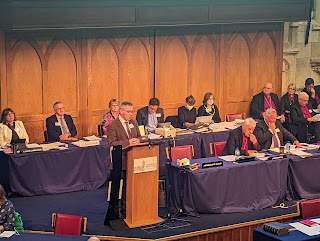Investing in fossil fuels is unethical
This is part 3 of a 3 part article 'Why is engagement with oil giants wrong?'
Many institutions promote ethical investment policies based on Environmental, Social, and Governance (ESG) factors. The aim is identify and invest in businesses what govern fairly and reduce the negative social and environmental impact of their business.
The Church of Ireland has a ESG policy and it does not invest in companies where more than 10% of profits are obtained from strategic military sales, the manufacture of tobacco products, or from coal mining activities (highest carbon emissions). The Church of Ireland Representative Church Body (RCB) ESG policy states,
Burning fossil fuels causes two major problems: air pollution and climate change.
Many institutions promote ethical investment policies based on Environmental, Social, and Governance (ESG) factors. The aim is identify and invest in businesses what govern fairly and reduce the negative social and environmental impact of their business.
The Church of Ireland has a ESG policy and it does not invest in companies where more than 10% of profits are obtained from strategic military sales, the manufacture of tobacco products, or from coal mining activities (highest carbon emissions). The Church of Ireland Representative Church Body (RCB) ESG policy states,
“RCB is committed to having a strong ‘ethical’ as well as a strong financial ‘balance sheet’.”It is good to see that the Church of Ireland aims to be an ethical investor.
Burning fossil fuels causes two major problems: air pollution and climate change.
Air Pollution
Already air pollution from burning fossil fuels is causing major consequences to human health. The UN World Health Organisation (WHO) estimates that 7 million people worldwide suffer premature death due to air pollution each year, with a further 400,000 killed as a result of climate change impacts (Climate vulnerability monitor 2012, Dara). This compares to tobacco which kills 6 million people each year (WHO), and conflict worldwide resulted in 180,000 fatalities in 2014 (International Institute for Strategic Studies).
It is clear that climate change impacts human health much more than arms sales.
The Head of the World Health Organization, Margaret Chan said,
 The risk of climate change from from burning fossil fuels is well established. In fact, it is increasingly recognised that climate change is the greatest threat we face. As UN Secretary General, Ban-Ki Moon said,
The risk of climate change from from burning fossil fuels is well established. In fact, it is increasingly recognised that climate change is the greatest threat we face. As UN Secretary General, Ban-Ki Moon said,
Is it ethical to invest in the fossil fuel industry that through air pollution and climate change is heading to disaster? Millions of lives could be saved by divesting from fossil fuels and investing in clean, renewable energy sources.
Rather than investing in fossil fuels and using engagement to try to influence these companies, ethical investors would be better to divest and invest in clean energy technologies. Engagement simply gives the companies an excuse to make very small investments in ‘green technologies’ whilst continuing to invest heavily in new mining and drilling operations.
I hope that ethical investors, like the Church of Ireland, will act quickly to invest in a clean, pollution free, ethical, balance sheet.
It is clear that climate change impacts human health much more than arms sales.
The Head of the World Health Organization, Margaret Chan said,
“Air pollution is one of the most important health risk factors globally, comparable to tobacco smoking”.
It is no surprise that the Lancet medical journal said that reducing emissions that cause climate change is
“the greatest global health opportunity of the 21st century”.The Church of Ireland’s decision not to invest in coal is welcomed. However, air pollution from transport, oil & gas powered stations, domestic & commercial heating, construction and industry together contribute more pollution than coal. The Department for Environment Food and Rural Affairs states that historically the main source of air pollution was coal, but
“These days, the major threat to clean air is now posed by traffic emissions.”It is not burning coal that is the problem, it is burning fossil fuels.
Climate change
 The risk of climate change from from burning fossil fuels is well established. In fact, it is increasingly recognised that climate change is the greatest threat we face. As UN Secretary General, Ban-Ki Moon said,
The risk of climate change from from burning fossil fuels is well established. In fact, it is increasingly recognised that climate change is the greatest threat we face. As UN Secretary General, Ban-Ki Moon said, “Climate change is, simply, the greatest collective challenge we face as a human family.”If carbon pollution continues unabated, global temperatures could rise to +3C or +4C by 2100. This might trigger run-away global warming, creating massive droughts, famines, sea level rise flooding counties and cities and even to ecological collapse.
Is it ethical to invest in the fossil fuel industry that through air pollution and climate change is heading to disaster? Millions of lives could be saved by divesting from fossil fuels and investing in clean, renewable energy sources.
Rather than investing in fossil fuels and using engagement to try to influence these companies, ethical investors would be better to divest and invest in clean energy technologies. Engagement simply gives the companies an excuse to make very small investments in ‘green technologies’ whilst continuing to invest heavily in new mining and drilling operations.
I hope that ethical investors, like the Church of Ireland, will act quickly to invest in a clean, pollution free, ethical, balance sheet.



Comments